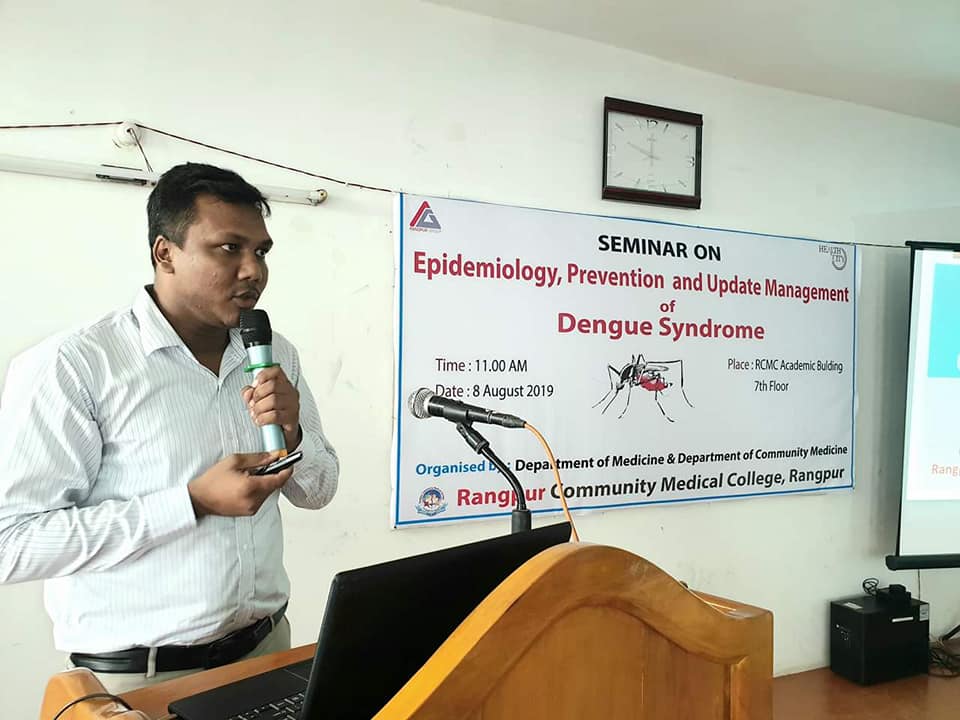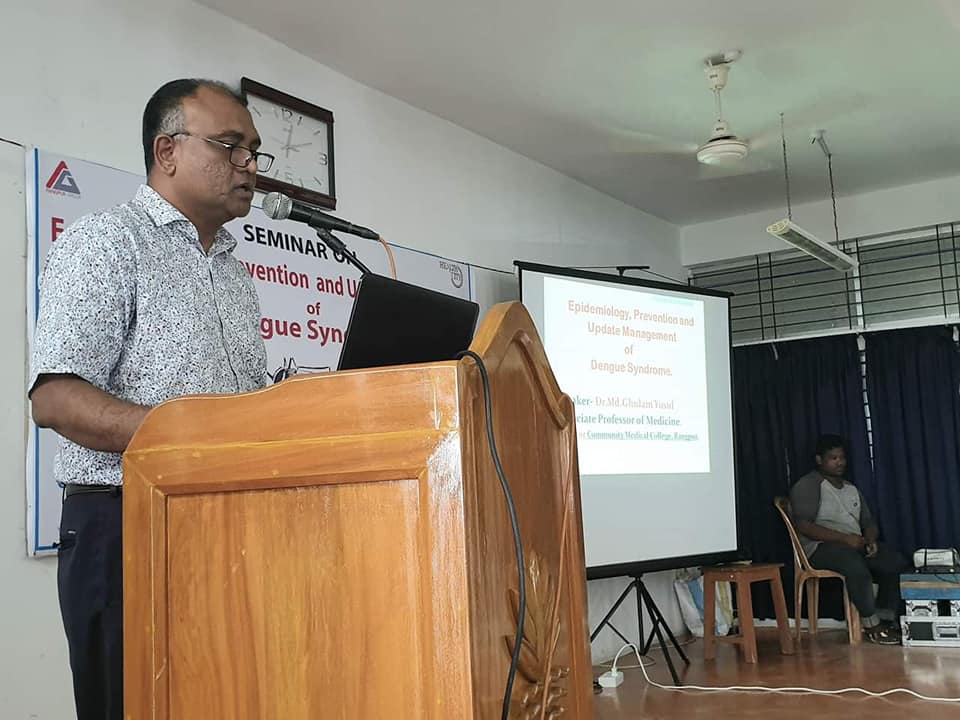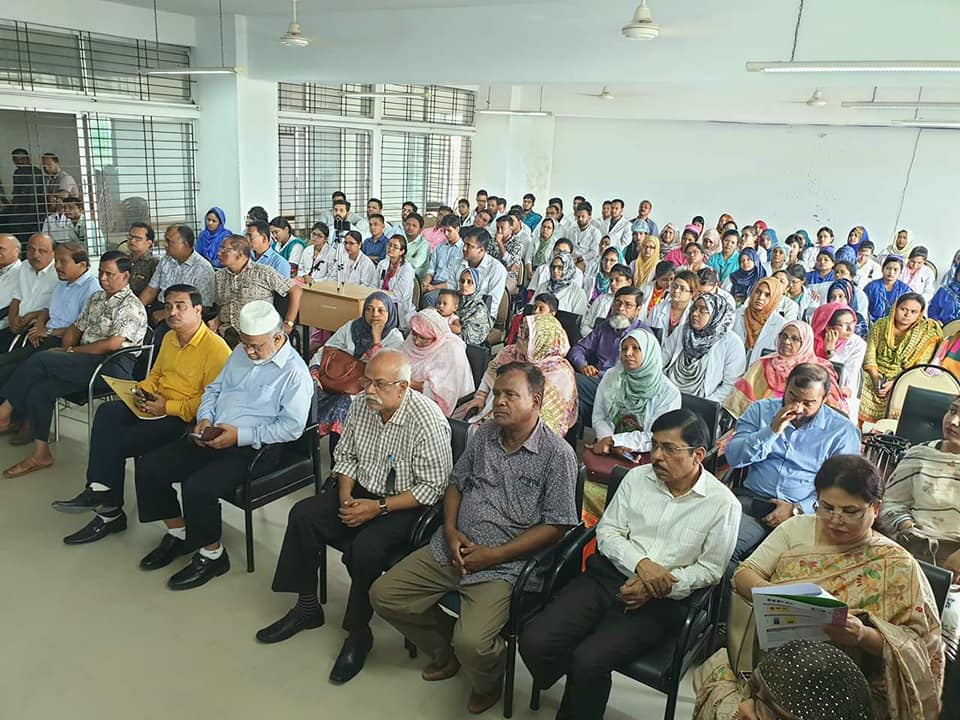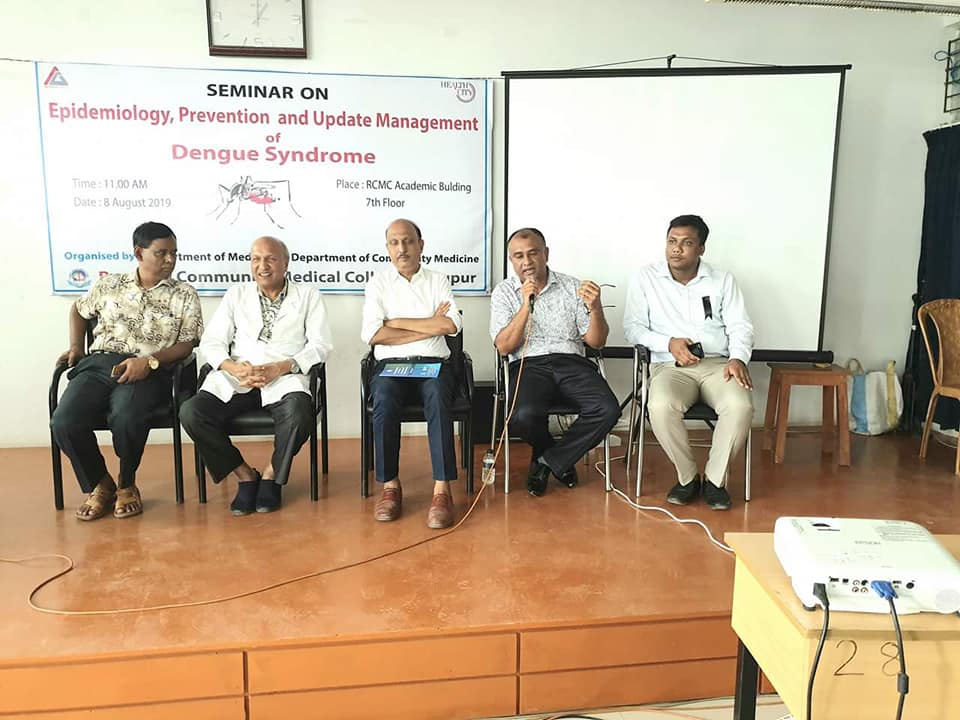10 Aug Department of Community Medicine & Department of Medicine of RCMC organized a Seminar on Dengue
Seminar on: Epidemiology, Prevention and Update Management of Dengue Syndrome

Organized by: Department of Community Medicine & Department of Medicine of Rangpur Community Medical College.
Keynote Speakers:
Dr. Md. Ghulam Yusuf; Associate Professor, Dept of Medicine presented his speech on the topic of update management of Dengue Syndrome
Dr. Shah Ahasanul Imran; Assistant Professor, Dept of Community Medicine presented his speech on Epidemiology & Prevention of Dengue
The panel of Experts:
★Professor Dr. Amaresh Chandra Shaha
★Professor Dr. Shamsuzzaman
★ Associate Professor Dr. Motiur Rahman
Principal Prof. Dr. Afruza Bulbul Akhtar, Vice Principal Prof. Dr. M. M. A. Wadud Mostafa, DMD Md. Asraful Alam Alamin, Director hospital Dr. Md. Rafiqul Islam, Dr. Syed Mamunur Rahman, Additional Director Hospital Md. Merazul Mohsin along All Professors, Teachers & Intern Doctor were present in this significant seminar.
Department of Community Medicine & Department of Medicine at the seminar hall of RCMC organized a seminar on “Epidemiology, Prevention and Update Management of Dengue Syndrome” on 8th August 2019. The seminar was conducted by Dr. Shah Ahasanul Imran, Assistant Professor, Department of Community Medicine, RCMC. He presented the epidemiology of Dengue and provided valuable insights regarding the measures to be taken to reduce the breeding of Aedes mosquito. Dengue fever is a painful, debilitating mosquito-borne disease. Aedes aegytpi, a species of mosquito, is the carrier of any one of the four closely related dengue virus serotypes — DENV 1, DENV 2, DENV 3 and DENV 4. Symptoms appear between 3 to 14 days (on average 4 to 7 days) after the infective bite. Dengue affects infants, young children and adults. Symptoms of dengue fever may include high fever, severe headaches, pain behind the eyes, severe joint and muscle pain, fatigue, nausea, vomiting, skin rash (usually 2 to 5 days after the onset of fever), and mild bleeding (such a nose bleed, bleeding gums, or easy bruising).

General advice for patients on home-care also suggested by Dr. Md. Ghulam Yusuf and he urged to follow the national guideline for Dengue to stay safe. For raising the awareness against dengue, the government published the national guideline for Dengue in the website of DGHS under the ministry of health and family welfare.
- Even if you are positive (+) for dengue NS1 Antigen test, you may not need immediate hospitalization. Negative (-) NS1 test does not exclude dengue illness.
- Hospital admissions will be determined by platelet count of the latest complete blood count (CBC). Home care should be always guided by a qualified doctor.
Platelets in our blood influence the coagulation process and are responsible for preventing bleeding. For this reason, it is recommended that you keep them within the advisable parameters. Dengue fever can lower the platelet count and could turn fatal. If the platelet count is significantly low due to dengue fever, one must consult a specialist doctor as early as possible and follow his instructions.
Fluid management for Dengue patients,
- Fluids should include not only water but also certain electrolyte solutions such as fruit juice, papaya juice, green coconut water, chicken soup, yogurt, etc.
- Drink enough fluids to maintain normal urine output. If the body weight is between 30 to 50 kilograms, take fluids to double the weight in millilitres (ml) per hour, according to medicine specialist doctor’s opinion
During the seminar, Dr. Md. Ghulam Yusuf, Associate Professor, Department of Medicine at RCMC highlighted how Bangladesh has remained hyperendemic for dengue since 2000, affected by unprecedented urban growth, overcrowding, poverty, and health inequalities. Considering the complexities involved with dengue transmission, he argued that understanding transmission requires encapsulating different disciplinary knowledge as well as non-academic knowledge. He also stressed on the fact that a persistently high rate of dengue infection both in Dhaka and outer districts is being influenced by the lack of knowledge and awareness of the eco-bio-social factors. The monsoon and post-monsoon in Bangladesh is the peak time to develop dengue. In Bangladesh
monsoon on usually happens during June and July of every year. The caseloads increase thereafter in August and September and can extend up to October.


The speakers of this seminar had properly explained and demonstrated the Epidemiology of the dengue fever in details. The four dengue viruses transmitted in tropical countries like Bangladesh can cause syndromes that are self-limited or severe. The common severe syndrome—dengue haemorrhagic fever/dengue shock syndrome (DHF/DSS)—is characterized by sudden vascular permeability generated by cytokines released when T cells (Lymphocyte) attack dengue-infected cells. Evidence suggests that enhancing and cross-reactive neutralizing antibodies regulate dengue epidemics and disease severity.
The panel of experts seated in front of the seminar hall to present the situation of dengue through medical science and provide insight into general queries on dengue fever. By arranging the questions and answers session between the experts’ panel and attendees, this seminar created the most significant improvement in the knowledge area on dengue outbreak for scheduled doctors, interns as well as hospital-related officials.

Sorry, the comment form is closed at this time.